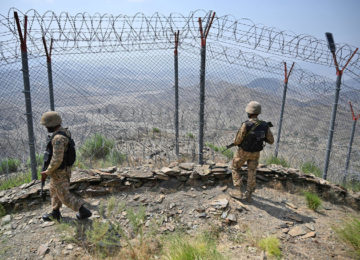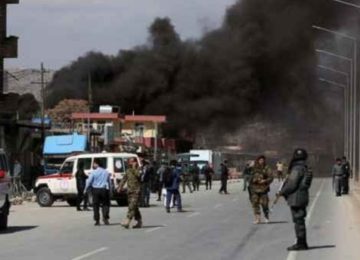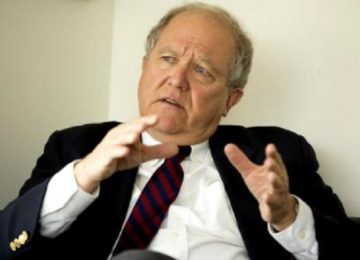July 02, 2021
With the US military moving towards the completion of its withdrawal from Afghanistan, the Biden administration is figuring out a formula to boost the economic and civilian assistance to Afghanistan, despite the majority of Afghans’ concerns about the government’s competence. The State Department submitted a document to the Congress assessing the Biden administration’s thoughts through U.S. engagement with Afghanistan after it winds down 20 years of war and nation-building that cost American taxpayers some $2 trillion. It also provided a more sober, behind-the-scenes assessment of how the Biden administration views Afghan President Ashraf Ghani and his ability to tackle corruption and manage the economy after the United States departs.
Inside the U.S. administration, officials are privately voicing concern that the fragile government lacks the basic ability to govern, even as a surge in Taliban offensives threatens to topple the government or plunge the country deeper into civil war.
“Bringing about and implementing a political settlement will require basic government functionality and political coherence,” the State Department reported to Congress in April, the same month U.S. President Joe Biden announced a full U.S. withdrawal from the country by Sept. 11.
“Weak governance and political institutions, as well as structural economic problems, leave the government ill-equipped to address these challenges,” the State Department added.
“The Afghan public is increasingly skeptical of the government’s commitment to the rule of law, to address corruption, and to appoint senior-level officials based on merit rather than personal allegiance. This mistrust is exacerbated by the inability of the government to deliver basic services to the population,” the report said.
(Some of this language was effectively copied and pasted from a public 2018 U.S. government document outlining the strategy on Afghanistan—a sign of how little has changed over years despite massive U.S. investment in Afghan governance programs).
When approached for comment, a State Department spokesperson did not directly address the document in question, but said a “negotiated settlement” between the Afghan government and Taliban “is the only way to end 40 years of war and bring Afghans the peace they seek,” and the spokesperson warned more conflict could hinder U.S. aid.
“While the United States has long experience delivering assistance in conflict zones, assistance will undoubtedly be more difficult to administer and both Afghanistan and the region’s economic development will suffer absent a political settlement,” the spokesperson said.
Biden’s post-withdrawal strategy is focused on increasing the Afghan government’s transparency, providing more avenues for citizens to participate in democracy, tamping down on rampant corruption, and strengthening the rule of law.
In its report, the State Department conceded that heightened Taliban violence would “pose significant risks to the peace process and to donors’ ability to deliver much-need development and humanitarian assistance.”
The Taliban have refused to move forward on peace talks with the Afghan government and taken over more than 80 districts since Biden’s withdrawal announcement, according to an analysis conducted by the Foundation for Defense of Democracies, a hawkish think tank. The group now controls nearly 40 percent of the country.
“The Taliban’s advances are more rapid than people expected,” said Lisa Curtis, an expert at the Center for a New American Security and former National Security Council senior director for South and Central Asia during the Trump administration. “The fact that they have taken so many districts in the north in just the last couple of weeks has surprised many people. … Now people are thinking, ‘Wow, this could happen a lot more quickly than we had originally thought.’”
Curtis said Ghani’s government could stave off more losses and reverse the Taliban’s gains by coordinating with other Afghan power brokers who have their own militias, such as the controversial warlord Abdul Rashid Dostum. “The government is starting to work with local power brokers, understanding they should leave aside their current differences, in order to band together to save the country,” she said.
She also said continued U.S. support, including financial, humanitarian, and security assistance, will be critical. But she and other experts on the region are not confident about the government’s ability to retain power in the long term.
During Ghani’s visit to Washington last week, Biden insisted the United States would remain a key partner for Afghanistan after the withdrawal of U.S. and coalition troops. “Our troops may be leaving, but support for Afghanistan is not ending,” Biden said.
Ghani downplayed U.S. intelligence assessments that indicated the Taliban could topple the Afghan government in six months, but he appeared to acknowledge the possibility of a potential civil war.
Ghani said Afghanistan was facing an “1861 moment, like President Lincoln,” referring to the year Abraham Lincoln entered office and the American Civil War broke out. Afghanistan, he said, is “rallying to the defense of the republic, determined that the republic is defended. It’s a choice of values, the values of an exclusionary system or an inclusionary system.”
“We are determined to have unity, coherence, national sense of sacrifice, and will not spare anything,” he added.
In open- and closed-door meetings in Washington last week, Ghani pressed U.S. officials and experts to keep up American aid to the Afghans, fearing a resurgence of the civil conflict that followed the 1989 drawdown of troops from the then-Soviet Union, which left a fledgling communist government to fend for itself.
“What I said to him and the group was that I think we need a narrative that’s credible even if it’s not probable about how the deterioration of Afghanistan can be stanched,” said Michael O’Hanlon, a senior fellow and director of research at the Brookings Institution, who met with Ghani during his visit. “It seems to me there’s a growing sense in the Western conversation that Rome is falling.”
So far, Biden has insisted that the money will keep flowing, pledging to back Ghani’s government with $266 million in humanitarian aid and $3.3 billion in weapons assistance. But Ghani spent some of his trip in listening mode, inviting a gaggle of experts to a dinner at the posh Willard InterContinental hotel last week. They urged the Afghan leader to push for American air support to stave off Taliban attacks on major cities, as well as keeping residual presence of Western contractors to help maintain the fledgling Afghan Air Force, according to sources familiar with the meeting.
Ghani also made the case that Afghan was a “neutral” country, in what some analysts read as a messaging effort to try to stop Pakistan and other neighboring countries from maneuvering for control of parts of the country after the U.S. withdrawal.
“The ability for the Afghan leaders to work together instead of fighting among themselves doesn’t seem to have been moved in a positive direction by this visit,” said David Sedney, a former deputy assistant secretary of defense for Afghanistan and Pakistan in the Obama administration. “The unity of the Afghan government is much reduced and the reliance of the Afghan government on the United States has proven to be a huge error in judgment on their part. Right now I don’t see any sign that they’re going to improve.”
And while the Taliban have warned their fighters in internal decrees not to attack American forces or harbor foreign militants under a withdrawal deal negotiated by the Trump administration, the group hasn’t shown any willingness to budge on peace negotiations.
The Taliban have rebuffed “every proposal to secure more specific commitments that would achieve a meaningful reduction in violence” at peace talks in Doha, the State Department reported. The group has also failed to fully implement a counterterrorism agreement with the United States that remains classified.
Meanwhile, the assessment of the violence has been getting direr from some senior U.S. military leaders. Speaking to a small group of reporters in Kabul on Tuesday, the commander of NATO’s waning Resolute Support mission Gen. Austin Scott Miller said the security situation was “not good” and hinted that the country could be on a path to civil war if the trajectory continues.
But some of Biden’s allies in Congress still see a way to engage with Afghanistan after the U.S. troop withdrawal. “A troop withdrawal doesn’t mean the end of U.S. engagement with Afghanistan—there are still areas we can support the Afghan people without a permanent military presence there,” said Sen. Chris Murphy, a Democrat from Connecticut who sits on the Foreign Relations Committee.
“The United States should continue supporting the Afghan National Security Forces, and expedite processing of Afghan Special Immigrant Visas. We should also continue pressing the Afghan government on anti-corruption to increase its legitimacy and work multilaterally with those who have a vested interest in the stability of the country,” Murphy said.
Courtesy: Foreign Policy








